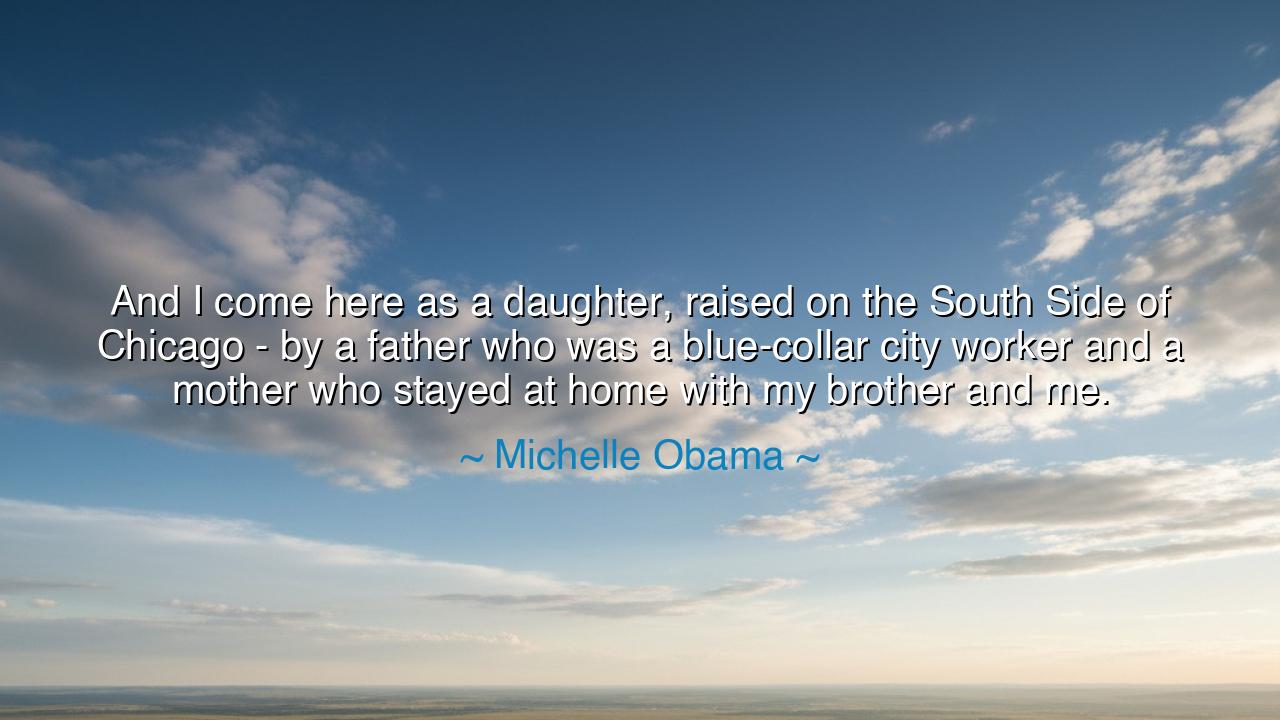
And I come here as a daughter, raised on the South Side of
And I come here as a daughter, raised on the South Side of Chicago - by a father who was a blue-collar city worker and a mother who stayed at home with my brother and me.






She stands and names her lineage like a banner unfurled: “And I come here as a daughter, raised on the South Side of Chicago—by a father who was a blue-collar city worker and a mother who stayed at home with my brother and me.” In this simple naming there is a whole cosmology of duty and gift. The word daughter is not ornament; it is oath. To be a daughter is to remember the hands that lifted you, the streets that steadied your first steps, the roof that taught you the grammar of enough. To be “raised on the South Side of Chicago” is to claim a soil that shaped your stride, a neighborhood that taught you how hope walks—practical, unafraid, always counting cost and blessing.
The sentence moves with a deliberate humility. Titles could be piled high; instead she calls upon the old authority—family and work. A father, not gilded, but blue-collar, serving the city with the quiet heroism of the everyday; a mother, sovereign of the domestic republic, whose office was presence, whose policy was care. The ancients would have applauded such measure: for they taught that public honor collapses when it is not fastened to private virtue. A polis is built first at the kitchen table, where promises are kept without applause.
Consider how each role in the sentence is a pillar. The city worker teaches gravity: you show up in winter as in spring; the streets are plowed, the water runs, the lights burn, and a child learns that love has a schedule. The stay-at-home mother teaches attention: lunch packed, lesson checked, a listening that makes a young soul legible to itself. Between them, the brother and the me learn the craft of mutuality—that no flourishing is solitary, that triumph is a team sport played across generations.
History keeps a mirror for this pattern. Think of Cincinnatus, summoned from his plow to lead Rome, who returned again to his field when the danger passed—public service braided to humble origin. Think, too, of countless unnamed women and men who stitched cities together with unglamorous work: the nurse pulling double shifts, the bus driver who knows every face on the route. Their lives rarely make oratory, yet their labor composes the background music to every noble speech. So when she declares herself a daughter of the South Side of Chicago, she situates her voice inside that ancient choir of ordinary greatness.
There is, as well, a quiet defiance in the naming. The world often writes its stories from the penthouse down; this sentence writes from the stoop up. It insists that leadership derived from the home can stand in the heaviest rooms; that the child trained by a blue-collar rhythm can read balance sheets of power without losing balance of soul. In an age dazzled by spectacle, the invocation of the father who labored and the mother who tended is a recalibration: greatness begins where gratitude remembers.
The meaning, then, is double. Personally, it is a confession of source—“I am not self-made; I am community-made.” Politically, it is a standard raised—“Judge me by what I carry from that house: work ethic, neighborliness, patience, and the will to leave places better than I found them.” To speak this way is to consecrate ambition, to tether ascent to origin, so that altitude never induces amnesia.
Take the lesson and make it law in your own days. Begin with naming: write the names of those whose unseen work underwrites your visible life—your mother, your father, your siblings, your block, your school—and say them aloud before you enter important rooms. Practice inheritance: carry one habit from your home into your public work—punctuality, fairness in small things, generosity with credit. Choose service that answers your street’s real needs, not your ego’s passing wants. And when you speak of yourself, remember the wise cadence of this sentence: lead with daughter, son, neighbor—then let the rest follow. In this rhythm, your voice will be strong without hardness, lifted without losing ground, and faithful to the people whose love first taught you how to stand.






AAdministratorAdministrator
Welcome, honored guests. Please leave a comment, we will respond soon